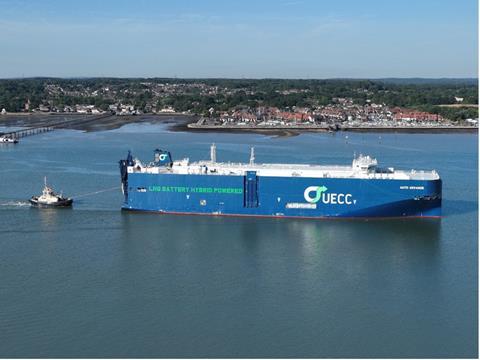Tugboats performing towage operations for UECC at the Scandinavian ports of Esbjerg, Gothenburg and Malmö will do so using carbon-neutral biofuels following a three-year deal between the European ro-ro operator and towage provider Svitzer.
Svitzer, a subsidiary of AP Moller-Maersk, will put its EcoTow tugs into operation to guide UECC’s pure car and truck carriers (PCTCs) calling at the ports. The agreement will reduce CO2 emissions from the towage operations by 300,000kg over the three years of the agreement. According to UECC that will reduce indirect emissions (called Scope 3) from its operations by 25%.

UECC said it has been using biofuels on its Autosky PCTC over the past two years to cut annual carbon output by around 60%. It said that effort helped promote the development of a wider bunkering network for biofuels that will be further supported by the pact with Svitzer.
“This project aligns with our own supplier policy, which looks to holistically reduce the environmental impact of our business operation, far beyond regulatory requirements,” said Daniel Gent, energy and sustainability manager at UECC. “UECC is demonstrating our willingness to ‘walk the talk’ and we once again call on our customers to join us as decarbonisation partners.”
Svitzer also has ambitious plans for a 50% reduction of CO2 emissions from its operations by the end of 2030 and fully carbon-neutral operations by 2040, initially through conversion to biofuels.
“We are extremely pleased to see UECC among the first-movers on EcoTow in Scandinavia,” said Sven Lumber, head of EcoTow at Svitzer. “With this agreement they join other global Svitzer customers who partner with us around decarbonisation, gaining the ability to include externally audited CO2 emission savings in their reporting. This shows a strong desire on the part of UECC to demonstrate environmental responsibility.
Green regulations
Regulatory measures designed to reduce carbon emissions from maritime transport mean vessel operators and shipowners need to find alternatives to traditional bunker, including in biofuels.
Those regulations include the proposed expansion of the EU’s Emissions Trading System (ETS) to include shipping within the next two years. That could raise the cost of consuming fossil fuels by around 50%, based on a current carbon price of around €80 ($81.1) per tonne of CO2.
Maritime logistics companies will also have to adhere to the International Maritime Organization’s (IMO) Carbon Intensity Indicator from January 1, 2023, as well as the FuelEU Maritime regulation due to be phased in from 2025.
UECC is also looking at the use of liquefied natural gas (LNG) and battery power to reduce NOx emission by up to 90%, and almost eliminate SOx and particular matter emissions.
The company will be among the first shipping companies to exceed the IMO’s 40% carbon intensity reduction target by 2030, through investments in a trio of newbuild multi-fuel LNG battery hybrid PCTCs, as well as the use of alternative fuels such as biodiesel and biogas on existing vessels.
The second of these newbuilds, Auto Achieve, was recently delivered from China’s Jiangnan Shipyard and will start trading this month, with the third vessel due for delivery in autumn this year.
Read more about sustainability in European short-sea shipping

























![Global[1]](https://d3n5uof8vony13.cloudfront.net/Pictures/web/a/d/s/global1_726550.svgz)













No comments yet